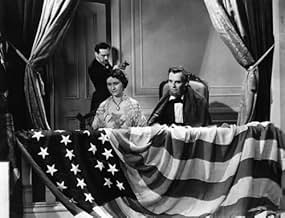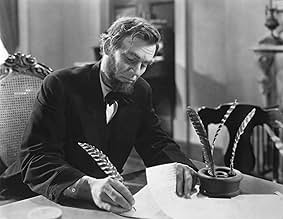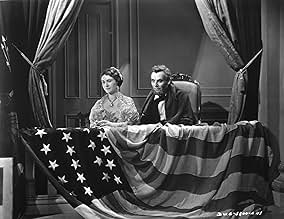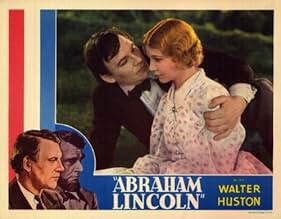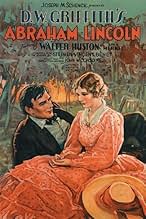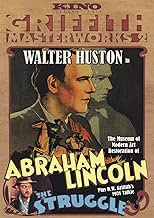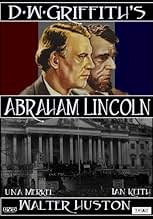La primera película hablada del maestro D.W. Griffith hace un repaso a la vida del famoso presidente norteamericano.La primera película hablada del maestro D.W. Griffith hace un repaso a la vida del famoso presidente norteamericano.La primera película hablada del maestro D.W. Griffith hace un repaso a la vida del famoso presidente norteamericano.
- Dirección
- Guionistas
- Elenco
- Premios
- 4 premios ganados en total
- Tom Lincoln
- (as W.L. Thorne)
- Armstrong
- (as Edgar Deering)
- Herndon
- (as Jason Robards)
- John Hay - Secretary to the President
- (as Cameron Prudhomme)
- Young Soldier
- (as Jimmie Eagle)
Opiniones destacadas
Walter Houston looks to be perfectly cast as 'Abe' - towering and dominant without being domineering and having that air of quiet authority. That he was humanitarian and resisted conflict whenever able to. It was nice also to have wife Mary's domestic quibbles thrown in, making this an interesting character study rather than a stiff history lesson.
As for history, no, I didn't learn a great deal, but didn't expect to. I wanted more to see how one of the great pioneering film directors portrayed another Great Man. The wonderfully produced epitaph in the final seconds showed testament to the power of them both.
Yes, the film's sound is hissy and pretty scratchy (I viewed it on-line at Internet Archive) but compared to most movies, certainly of that era and posted on that site, I found it surprisingly enjoyable and effortless.
Unfortunately, the film necessarily includes Lincoln's political life, and here it moves from poetic license to outright falsehood. Slavery was the central issue of Lincoln's political career, a fact that Griffith tries to obscure, going so far as to turn Lincoln's pivotal 'House Divided' speech into an argument against secession. This is particularly ironic since it was really Lincoln's battle cry against encroaching slavery. When South Carolinians seceded two years later, this was the speech they pointed to as proof that when Lincoln took office, "the slaveholding States will no longer have the power of self-government ... and the Federal Government will have become their enemy."
During Lincoln's presidency, the question of slavery occupied much of his time and attention, yet again Griffith chooses to ignore it. His Lincoln spends more time admiring the courage of Confederate soldiers than worrying about slavery. Even the Emancipation Proclamation gets only the briefest attention. Lincoln reads a line from the document, signs it, and says, "Well, gentlemen, it is done." It's oddly dismissive, coming from a man who considered emancipation the central act of his presidency and the most meaningful act of his life.
Denied his opposition to slavery and concomitant commitment to democracy and the inalienable rights of man, Lincoln is reduced to endlessly repeating, "The Union must be preserved." Why it must be preserved is left to the audience's imagination. The film never gives us the slightest clue.
Abraham Lincoln is one of two sound films made by movie pioneer, David W. Griffith. It's also something of an atonement for Griffith who was accused fostering racism with his masterpiece silent work, The Birth of a Nation.
Maybe if Abraham Lincoln had been a better film it would have succeeded in being an atonement. It certainly had one of the best interpreters of Lincoln ever in Walter Huston. The film also in many ways looks like a newsreel of the Civil War era. Our image of that era and you can see it in Ken Burns documentary comes from Matthew Brady's still photographs. In crafting this and The Birth of a Nation, Griffith was heavily influenced by Brady's still photographs.
Lincoln's prarie years were better told in Abe Lincoln in Illinois and Young Mr. Lincoln. Griffith should have stuck to the war years and made it in fact the Lincoln family story. One thing that would have done is eliminated Una Merkel as Ann Rutledge. Una Merkel had many a good role as a wisecracking dame in modern films. But in Abraham Lincoln she's just awful as Lincoln's lost love Ann Rutledge. It's a miracle she had a career after this film and a good one.
¿Sabías que…?
- TriviaThis was D.W. Griffith's first sound film. Abraham Lincoln (1930) was also the first sound film about the Civil War which veterans of that war could view.
- ErroresIn both the Union and Confederate parades, the musicians play trombones with forward facing bells. During the Civil War, the bells faced backwards.
- Citas
[death scene]
Ann Rutledge: I know the truth, dear. It's goodbye.
Abraham Lincoln: No, no, Ann, dear. You're not going to leave me. I won't let you!
Ann Rutledge: We must be brave, dear...
[looking up to the heavens]
Ann Rutledge: Don't take me away. Don't take me away! It's so dark and lonesome!
Abraham Lincoln: Ann, you mustn't let go.
Ann Rutledge: If they'd sing, I wouldn't be so afraid.
[a chorus of "Sweet By and By" swells up in the background]
Ann Rutledge: We will meet there, dear.
- Versiones alternativasOriginally, this film was color-tinted in sepia-tone, with blue for night scenes. These prints also had a prologue. Current public-domain prints are in black and white, minus the prologue with a shorter running time.
- ConexionesEdited into General Spanky (1936)
- Bandas sonorasBattle Hymn of the Republic
(ca 1856) (uncredited)
Music by William Steffe
Lyrics by Julia Ward Howe (1862)
Played during the opening credits and often in the score
Sung by an offscreen chorus during a civil war scene
Selecciones populares
- How long is Abraham Lincoln?Con tecnología de Alexa
Detalles
- Fecha de lanzamiento
- País de origen
- Idioma
- También se conoce como
- D.W. Griffith's Abraham Lincoln
- Productoras
- Ver más créditos de la compañía en IMDbPro
- Tiempo de ejecución
- 1h 36min(96 min)
- Color
- Relación de aspecto
- 1.20 : 1

